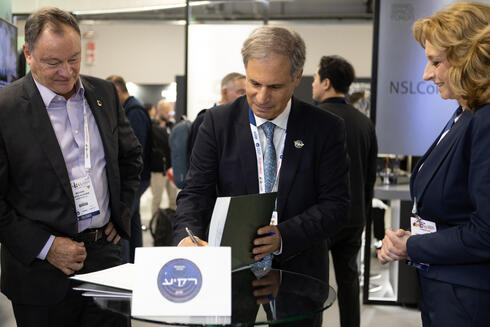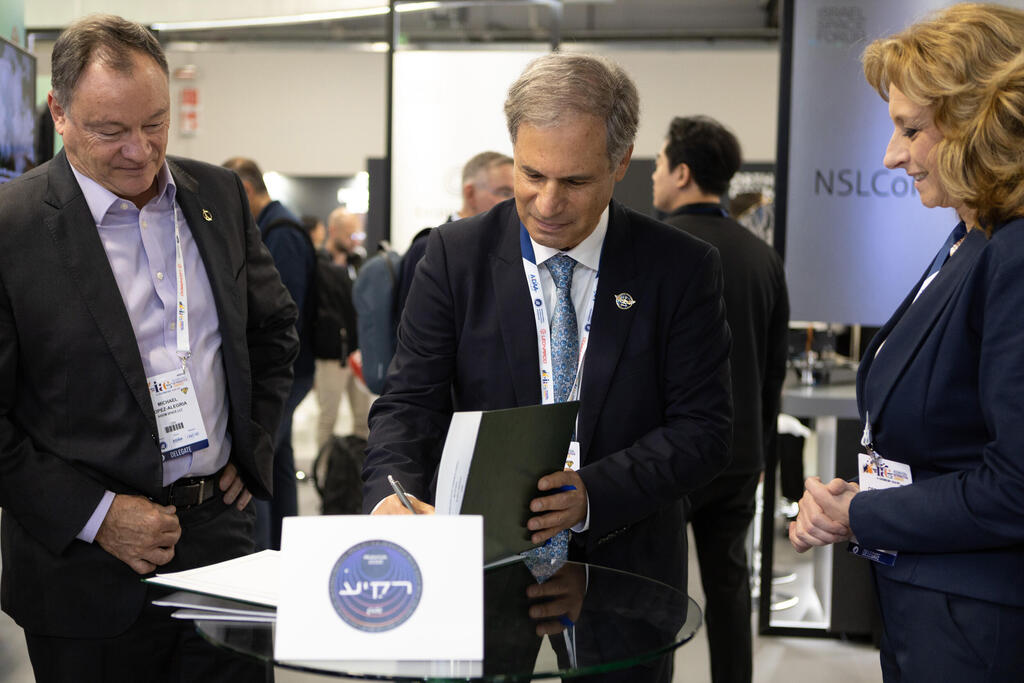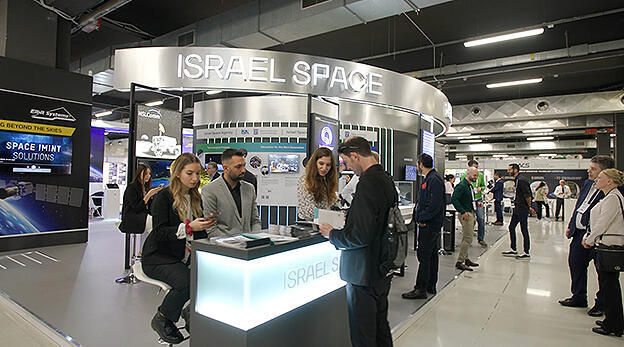
Israel expands space influence with new partnerships at International Astronautical Congress
During the International Astronautical Congress in Milan, Israel’s Rakia space mission signed cooperation agreements with Hungary and is conducting advanced talks with Poland on managing private missions and building programs for space missions.
Israel strengthened its position as a key player in the global space industry at the International Astronautical Congress (IAC) held last week in Milan, with a series of new partnerships signed by Rakia - Israel’s Space Mission, including with space missions from Hungary, and soon with Poland. Rakia manages private missions, develops astronauts' work programs, scientific plans, educational programs, artistic initiatives, and establishes control rooms. Additionally, technological collaboration talks are underway with Italy, known for its leadership in building future space stations.
2 View gallery


Eytan Stibbe (C) signing agreements with Hungarian representatives at the IAC in Milan.
(Credit: Leanne R. T.)
The agreements signed at the conference are the result of continuous efforts by the Israeli industry to expand its influence on the international stage. The collaboration with Hungary will allow a Hungarian astronaut to participate in a private space mission, with Rakia assisting in developing scientific content and engaging the public, particularly through integration with the education system. Meetings were held with representatives from Poland, which is also expected to join these efforts, focusing on developing space-related educational programs to expose children and citizens to advanced scientific activities in space.
“The connections being forged here are very important for Israel,” said Israeli astronaut Eytan Stibbe, who was a crew member on the AX-1 mission to the International Space Station. The mission commenced on April 8, 2022, and lasted 17 days, during which more than 140 science, education, and art activities were conducted.
Following the completion of the Rakia mission and Stibbe’s return to Earth, the Rakia team decided to continue operating as a public company to promote and develop the space industry in Israel. As a company, Rakia’s goal is to advance and develop Israel’s space ecosystem, strengthen international collaborations, man space missions, with the philosophy of "space for everyone."
According to Stibbe, “The space industry is highly competitive, with high entry barriers. Collaborations allow us to expose the Israeli industry to international stakeholders and share knowledge and technology.” Beyond collaborations, Stibbe pointed to one of the most significant challenges in the space industry today - growing congestion in Earth's orbits. “We are witnessing a dramatic increase in the number of satellites launched annually. In 2024, over 2,500 objects were sent into space - a massively unprecedented number. This creates congestion problems and increases the risk of collisions.”
The solution lies in creating control mechanisms similar to those used in air traffic management, Stibbe says. “The world will need to address the need for space traffic control and management, just as we manage air traffic, to prevent collisions, particularly with space debris which endangers existing satellites and space stations.”
However, global cooperation in the rapidly developing space industry, is key. “No country can succeed alone in this field,” he says. The industry is becoming more and more integrated and collaborations between governments, private companies, and international organizations are essential for solving issues such as space traffic management and collision prevention, as well as for developing new technologies and reducing costs. “Israel, despite its small size, succeeds in significantly integrating into the global space industry thanks to these kinds of collaborations. This proves that strength lies in cooperation, and through joint efforts, we can go further, even to the stars.”
Stibbe also addressed the significant change the space field has undergone in recent years, particularly regarding astronaut launches. In the past, only large countries like the United States and Russia sent astronauts to space, but today, smaller countries are doing so, sometimes on private missions. “We’ve seen how countries like Saudi Arabia, Italy, and India are sending astronauts on private missions to strengthen their standing in the space industry,” he noted. This trend, he says, allows more countries to participate in the space race and be part of developments which will shape humanity’s future in space.
Regarding the physiological challenges of long-term life in space, Stibbe said, “So far, most astronauts sent into space have been young and healthy, but in the future, if we want to expand to other planets, we will need to deal with a different reality in which children and elderly people might find themselves in space." He added that current research is focusing on how the human body functions in microgravity or weak gravity and how medical and environmental systems can be adapted to these conditions.
Beyond immediate concerns, Stibbe emphasized the importance of educating the next generation to participate in the space industry. “Today’s children are tomorrow’s engineers and researchers,” he said, adding that exposure to space should begin at a young age through educational programs that present not only the technological challenges but also the artistic and philosophical aspects of space exploration. “We need to spark young people’s imagination and curiosity, and show them that space is not just a technical field, but also a world where there’s room to dream and ask big questions about our place in the universe,” he concluded.















